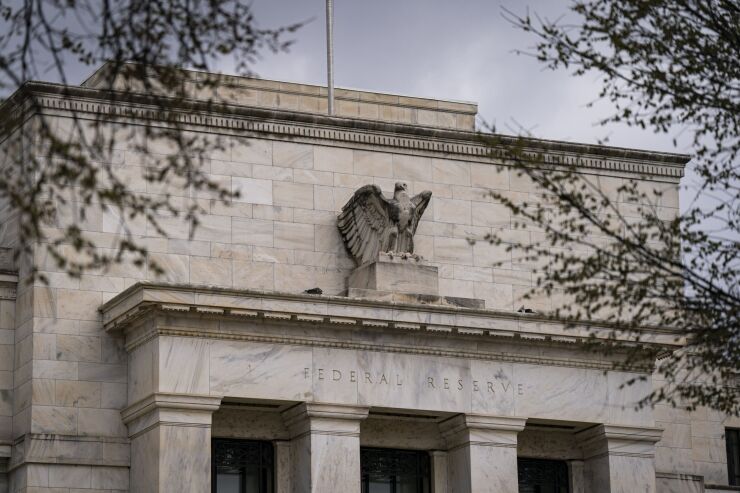
The Federal Reserve has issued a cease-and-desist order against
The Fed, which supervises both the Provo, Utah, bank and its Austin, Texas-based holding company, Green Dot Corporation, said its examiners also identified "significant deficiencies" related to its ability to identify suspicious activity and prevent money laundering.
Green Dot warned investors earlier this year that an enforcement action might be coming its way. During a February earnings call, Chief Financial Officer Jess Unruh said the bank set
Green Dot CEO George Gresham issued a written statement on Friday stating that the deficiencies cited in the enforcement action were years old and the firm has taken steps to remedy them and improve processes. He added that the company has worked with regulators to address the matters.
"We are committed to cooperating and partnering closely with our regulators to ensure all concerns noted in the consent order are addressed and complied with and that our customers are well-served and protected on an ongoing basis," Gresham said. "As stewards of our customers' valued resources, we take this commitment and responsibility very seriously."
In the public enforcement action released Friday, the Fed said Green Dot violated consumer protection laws in the way it marketed, sold and serviced its prepaid card products. These include false packaging statements saying that accounts would be closed once a balance reaches zero when, in fact, accounts remained open and incurred monthly fees.
The Fed also said Green Dot included false statements on its debit card packaging about customers being able to register their cards by phone. The cease-and-desist order also noted lackluster policies for lifting account blocks and a third-party issue that resulted in extended authorization holds, both of which deprived customers of their funds.
Green Dot Corporation was also cited for deceptive practices by another one of its subsidiaries, Santa Barbara Tax Products Group, between 2017 and 2022. The subsidiary had a contract with an unnamed major tax preparation service to handle payments, according to the enforcement action. The group advertised that consumers would pay "nothing out of pocket" for preparation services if they deducted the payment from their returns. However, customers were charged a separate processing fee disclosed only in small print.
In addition to these specific incidents, the Fed noted that various risk mitigation policies within the bank were not acceptable. These include its adherence to anti-money-laundering and Bank Secrecy Act, or AML/BSA, standards and its system for flagging suspicious activities.
Green Dot entered into a consent agreement with the Fed, agreeing to the terms of the order and waiving its right to challenge it.
Along with the fine, the company has also agreed to bring in a third party to identify the root causes of its compliance deficiencies and devise new programs. It also must hire an outside group to monitor transaction activity.
Green Dot has also agreed to take steps to remedy its past discretions and ensure they do not happen again. It also must provide written plans for improving its board oversight and making other improvements. Likewise, it will provide regular updates to the Fed about its progress toward its various obligations.
Jiko action
The Fed also issued a separate and unrelated enforcement action against the Jiko Group, a bank holding company that owns Mid-Central National Bank.
Jiko began as a financial technology platform. It
In the cease-and-desist order, the Fed noted several issues with the firm's financial condition, including its cash flow, liquidity and earnings, as well as its capital and strategic planning. The bank has agreed to address these issues and improve its oversight mechanisms.
Jiko's technology platform offers customers the ability to invest funds into Treasury bills rather than traditional deposit accounts so they can earn higher yields.
Jiko Securities provides brokerage account services for other financial institutions, including the recently launched fintech
Fintech partner banks have seen





